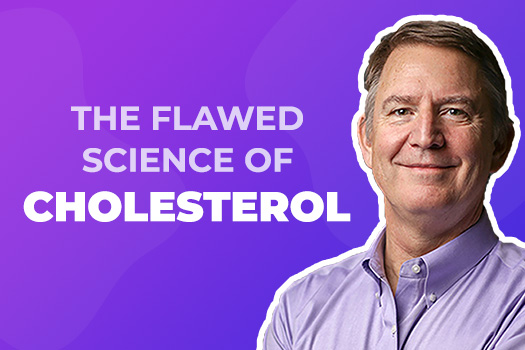How did we come to believe that saturated fat was the root cause of increasing blood cholesterol and, more specifically, LDL cholesterol?
It’s an interesting story that all started with feeding rabbits cholesterol. There were some researchers who thought through very carefully how to evaluate food. Rabbits developed a lesion or a spot on the arteries, like humans do, that looked like atherosclerosis – the problem we don’t want, which leads to heart attacks and strokes. That study with the rabbits then led to some weak science – it’s called “epidemiology” – where you try to examine different factors that people tell you they’re doing and relate it to different diseases. Suffice to say that the studies were done to prove what they already thought they knew to be true from the rabbit study.
There’s something called the Seven Countries Study and the PhD researcher who did the study, Ancel Keys, published it, and then talked about it over and over. The whole idea that saturated fat in the food led to elevated cholesterol, which led to the arterial damage, was not soundly rooted in what we call experimental evidence or randomized, controlled trials, where you control one factor or very few factors and get to test whether that factor is important for causing the disease associated with it. This weak science is what we call “hypothesis-generating research” – meaning that you can generate questions, but it doesn’t prove or disprove anything, because it’s not experimental science. This kind of shaky ground was the theory that saturated fat causes disease.
The American dietary guidelines have now changed their view on saturated fats in the diet. Tell us a little bit more about that.
Now, in 2021, after decades of recommendations saying restrict saturated fats, the guidelines have quietly removed that restriction on dietary fat and dietary cholesterol. While the researchers have known this for a while worldwide, the guidelines panels and the experts have been very resistant to changing that message. In modern day recommendations, however, there is no restriction on dietary cholesterol and dietary saturated fat by organizations that don’t have some sort of agenda to push. You’re going to find some organizations that still have that there, but these were organizations that were basically created on that belief. It would be like having a religious group say that there was no God, when the religion is based on a belief in God. Organizations that were started because of a belief that saturated fat was bad aren’t going to change their recommendations.
Now that we know that saturated fat doesn’t in fact clog your arteries, are there some benefits to eating saturated fat?
There were some things that didn’t make sense to me in my medical training. One is that cholesterol is found in every cell in our bodies; it’s necessary for the membranes and hormone function. To restrict cholesterol never made sense to me. In fact, if you restrict cholesterol in your food, you make more of it in your liver. (When you eat less cholesterol, your body makes more of it.) Similarly, with saturated fat, we make it in our livers from carbohydrates to store the energy in our own body. We use saturated fats as a storage mechanism for fuel. How could it be bad for you?
When you really look at the biology and the way our bodies work, it makes no sense to target these “suspects,” if you will, especially now knowing that the science it was founded on was weak and has not been borne out in larger trials. When randomized trials were finally done, looking at low-fat diets that lower saturated fat and cholesterol, they were not shown to do anything beneficial. They didn’t reduce heart disease, they didn’t reduce the possibility of a stroke, and they didn’t reduce cancer. The theory didn’t hold up.
Talking about cholesterol and saturated fat, we know that if you increase saturated fat in your diet, your LDL cholesterol may go up. In conjunction with a keto diet, this promotes larger-sized LDL particles versus the small, dense particles. Why is that important?
Saturated fat and cholesterol in the food is fine. The traditional teaching is that these lipoprotein particles that transport cholesterol in the blood are the bad guys. If you develop drugs that lower the LDL cholesterol particle, you can reduce the recurring heart attacks and recurrent strokes a little bit. Medicines that cause this change in the LDL can have some benefit, but now that you get into the size of the particles, the large LDL particles actually are thought not to be the ones that cause the damage; it’s the small LDL particles. Medicines that reduce LDL particles reduce them across the board. A keto diet changes the small particles into the large particles for just about everyone, even if the total LDL number goes up. What ties it all together is this inflammation and metabolic syndrome. The drugs that lower LDL actually lower the inflammation as well, so it may be that all of this is working on the same team, so to speak, by lowering inflammation. The keto diet and the drugs that lower LDL and lower inflammation actually are lowering the risk for heart disease that comes from metabolic syndrome.
Check out the full video here.
